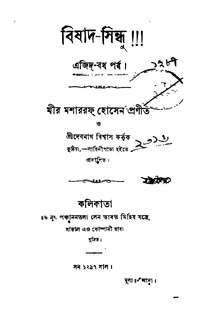Bishad Shindhu
 Cover image of the 3rd part of Bishad Shindhu (1890) | |
| Author | Mir Mosarraf Hussain |
|---|---|
| Original title | বিষাদসিন্ধু |
| Country | Bengal Presidency |
| Language | Bengali |
Bishad Shindhu (Bengali: বিষাদ-সিন্ধু, English: Ocean of Sorrow) is a Bengali epic novel by Mir Mosarraf Hussain, the first modern Bengali Muslim writer and novelist. Regarded as a central work of Bengali literature, and Hussain's finest literary achievement, the novel presents a fictional account of the lives of Muhammad's grandsons, Hasan and Husayn, and the Battle of Karbala.[1]
Background
In 1869, Michael Madhusudan Dutt wrote in a letter to Raj Narain that "If a great poet were to rise among the Mussulmans of India, he could write a magnificent Epic on the death of Hossen and his brother. He could enlist the feelings of the whole race on his behalf.”[2] Within three decades, Mosharraf Hussain came up with Bishad Shindhu though not in verse but in prose. The novel was originally published in three parts in 1885, 1887 and 1891 respectively.[3][4] The novel was later published in its entirety.[1]
Literary style
Mosharraf Hossain did not restrict the narrative to historical facts, and took novelistic liberties, adding the psychological drama around Zaynab for instance, which contributes to the characterization of the vindictive Yazid, or the supernatural manifestations after the battle at Karbala.[2] He created an engaging blend of Bankim-derived high literary Bangla and the popular emotional appeal of the punthi literature of his time, which included many retellings of the Karbala tragedy.[2]
Main characters
- Hasan ibn Ali, elder brother of Husayn, grandson of Muhammad, son of Khalifa Ali ibn Abu Talib and Fatima Zahra
- Husayn ibn Ali, younger brother of Hasan, grandson of Muhammad, son of Khalifa Ali and Fatema
- Yajid, son of Muabia (a companion of Muḥammad ), a rival of Hasan and Husayn for the throne
- Shimar, Husayn's killer
References
- 1 2 "Bisad-Sindhu - Banglapedia". en.banglapedia.org. Retrieved 2018-05-19.
- 1 2 3 "A modern epic for Bengal". Dhaka Tribune. 2018-03-12. Retrieved 2018-06-02.
- ↑ Dalmia, Vasudha; Sadana, Rashmi (2012), The Cambridge Companion to Modern Indian Culture, Cambridge University Press, p. 108, ISBN 1139825461
- ↑ Osmany, Shireen Hasan (1992), Bangladeshi nationalism: history of dialectics and dimensions, University Press, p. 61, ISBN 9840511882
External links
| Bengali Wikisource has original text related to this article: |